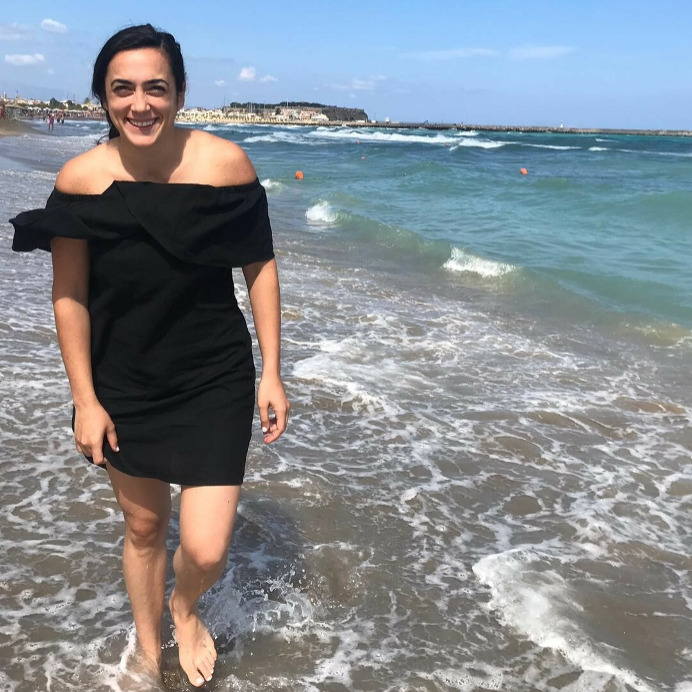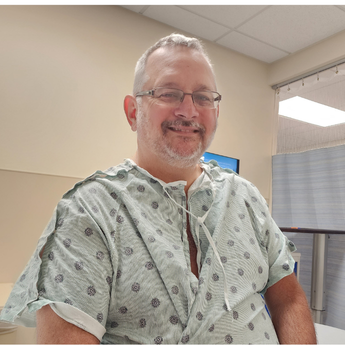 By Stacey Katsuras
By Stacey Katsuras
It all started in July 2021. A drop of bloody nipple discharge led me down the rabbit hole of Google and WebMD which, for once, was actually reassuring – it’s usually harmless. I scheduled an appointment with my doctor the following day who shared the same sentiment – it’s probably nothing, but I will refer you to a breast clinic just in case. As a 30-year-old with no family history of breast cancer and a couple of benign fibroadenomas, I wasn’t too worried, and neither was my Surgical Oncologist initially; the odds were in my favour, it was likely benign. And so I attended my ultrasound, mammogram, and biopsy appointments – each time observing how the other women in the waiting room were decades older than me.
The results were in and I was once again assured that it was probably benign, but since it was symptomatic, I should get it surgically removed with a lumpectomy. It turns out I was against the odds. Pathology reports revealed that it was ductal carcinoma in situ (DCIS; stage 0 breast cancer) and the margins were positive, meaning more of the tumour was likely still present. It took some time to process this and begin considering my options only to have my MRI results show that the remaining tumour was actually extensive, and the only treatment option would be a complete unilateral mastectomy.
At this point, I knew to brace myself for all appointments going forward – especially ones where they actually allow you to bring a loved one for support in the middle of a pandemic.
As it turned out, the tumour they removed in the mastectomy demonstrated signs of being invasive (upgrade to stage 1), but my lymph node was clear (thank God). The next step would be 5 years of hormone therapy to prevent recurrence and while this was relatively good news overall (no chemo), it was a lot to take in for my husband and I who were thinking of starting a family in the near future and would now have to put that off. Even though fertility was never really mentioned because “I am young”, we advocated for ourselves and scrambled to squeeze in two quick cycles of egg retrieval/IVF – the fastest $30k we ever spent, but worth every penny to hold onto hope for our future.
I have never experienced as much emotion in such a short amount of time as the last 8 months – from anger, sadness, exhaustion, and anxiety, to gratitude, calmness, and hope.
This journey has not been easy for me or my family. Every step of the way has felt like a confusing waiting game, and the news seemed to be getting progressively worse.
As the anxiety and the fear grew, so did the support from those around me. Getting showered with so much love, prayer, and kindness has filled me with overwhelming gratitude. While it can sometimes be hard to see when you are in the midst of a storm, now that things have calmed down, I look around and see so much in my life to be grateful for. And besides, I now have battle scars to serve as a daily reminder to live each day to the fullest – to soak up time with the ones I love and to keep life’s special moments close to my heart.
While breast cancer is known to be relatively common overall, breast cancer in young women is rare and can come with many unique challenges – fertility issues, raising young children, and establishing one’s career, among others. Worse yet, if diagnosed at a later stage the chances of survival are drastically reduced, making early detection imperative. I am so incredibly thankful that I became symptomatic and that I took my symptoms seriously. I encourage all of the women in my life to be aware of their body, to check their breasts, to talk to their healthcare providers, to research, to ask questions, and to advocate for themselves when needed.
Month 1 of hormone therapy is complete – I never imagined that I’d have the menopause experience in my 30s, but here we are. Others have managed and so will I.
Learn about submitting your own patient story here.






